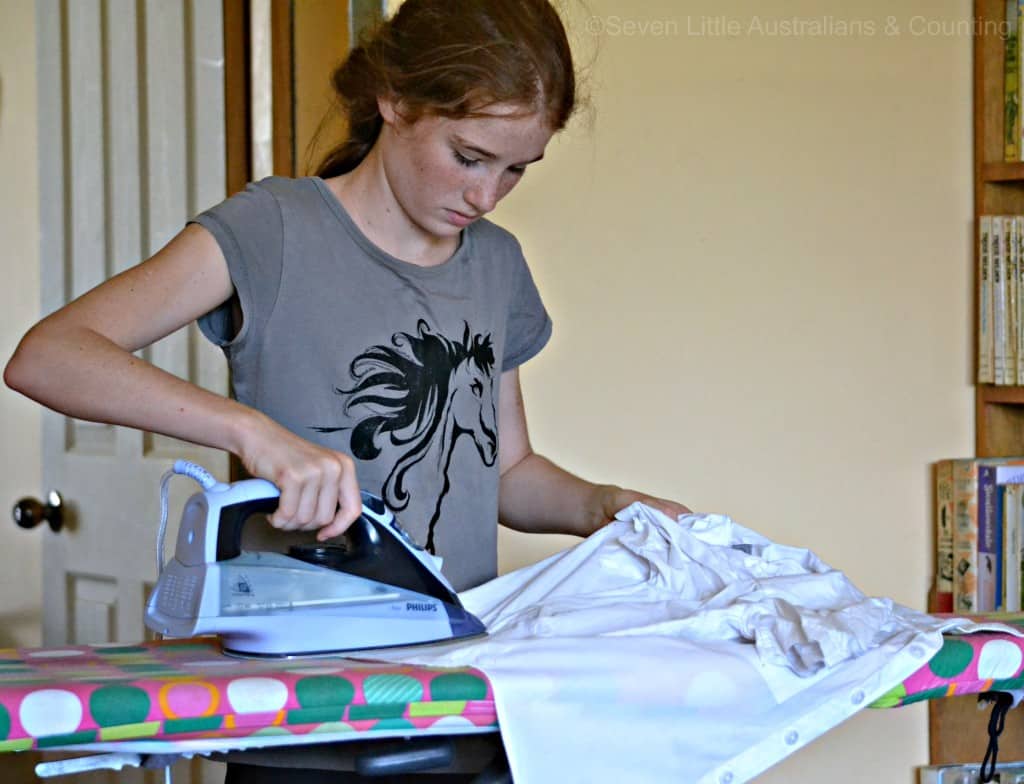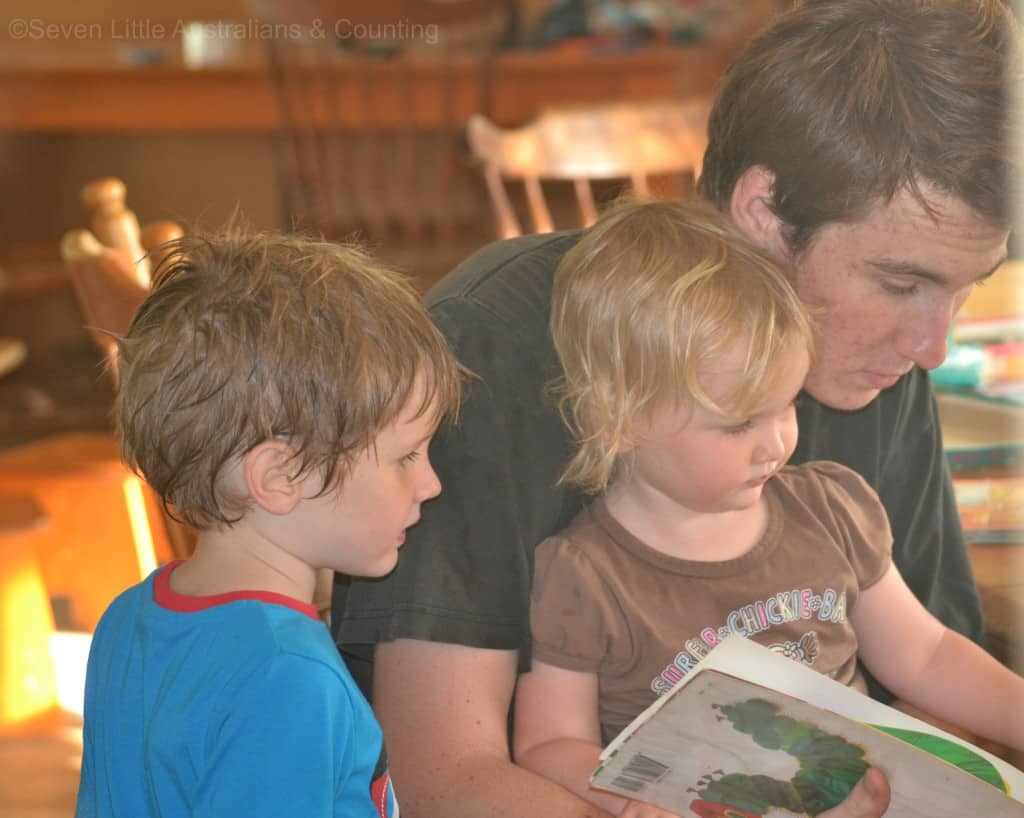Erin lives on the North Coast of NSW, Australia with her husband and ten children ranging from twenty-three to two years. She has been involved in home education since her teens in the 80s as her family were part of the pioneering home education movement in Australia. Erin and her husband have always home educated their children and live in a home they have been owner building for the past seven years on a large rural property, where they are surrounded by thousands of books. You can read more from Erin at Seven Little Australians and Counting, and follow her on Instagram and Facebook.

We’ve been parenting/homeschooling for over two decades now – doesn’t it sound like a long time? Not sure if it feels long or not ? One of the gifts of having several children over a twenty year span is that our hard won wisdom doesn’t go to waste, as our younger children benefit from our earlier experience.
We’d like to share 9 tips with you that we’ve learnt along the way, in this parenting, home educating journey, come along and travel with us.

It’s All About Relationships
Focus on nurturing relationships; your relationship with your spouse, each child, the relationships between siblings, and your relationship and theirs with Our Heavenly Father. All are of paramount importance and relationships are what this journey is all about. Enjoy one another, create memories, and embrace your unique family culture. You may be a family that enjoys reading together, playing board games, enjoying the outdoors, being active, or all these and more. Treasure this time together, it will pass all too quickly-but the foundation laid now will be the bedrock that holds.
Keep Your ‘Vision’ in Sight
We each embark on Home Education for our own reasons, often a variety of them, but it will always includes a ‘bigger picture,’ a dream, a vision for our children and our family. Whilst some of the reasons we begin this journey are not necessarily the reasons we continue, our vision will further crystallise as we continue. Home Education is a rich, rewarding lifestyle but there will be times when you are bought to your knees. Always keep the vision in sight to encourage and remind yourselves why you are traveling this journey.
Develop Good Habits
Forming good habits are far more important than you may think. I know I didn’t give them enough weight in the earlier years. The habits children develop when young are taken with them into adulthood, the good and bad. Manners, time management, chore skills, personal hygiene, exercise, health choices, work ethic, interpersonal skills, all these and more are developed before leaving home. Focus on instilling good habits.

Foster Strong Interpersonal Skills
Assist your child in developing strong interpersonal skills. Teach him how to communicate and interact with others, individually and in groups as these life skills are important for success in personal and professional life. Seek out opportunities to teach a variety of life skills. Be part of the wider community, give your child a wide frame of experience, and model, instruct and role play how to interact in various situations. Encourage your child to show compassion and kindness to others. Strategise teaching these life skills, don’t leave it to chance, this is part of your parenting responsibility. Encourage independence as your child will be leaving home all too soon – prepare him well.
Know and Accept Your Teaching Style and Your Child’s Learning Style
God created you exactly as you are, unique. Don’t waste time trying to make yourself into someone you are not, or feeling guilty that you are not as talented in the areas it appears your friends or other homeschooling mamas are. Accept yourself as He made you, you have unique talents and they are sufficient, and most of all love your child.
God created your child as He wanted. Don’t wish your child’s learning style is different to what it is, or compare him to others. Accept and tailor your teaching approach to your child’s learning style where you can, and remember there is always ‘more than one way to skin a cat’. Embrace and treasure your child for who he uniquely is.
Immerse Your Family in Rich Literature
Foster a reading culture within your family and read aloud together often. Parents can read to children, or siblings read to one another. If you struggle to read aloud, utilise audio books. Provide quality books for your children to read independently and encourage them to read regularly-model reading and show your children that literature is valued as part of your family culture. The benefits are many; language skills, literacy skills, a rich imagination, and most of all close family connections.
Build a Strong Foundation in the Early Years
Build a solid base for learning by focusing on the 4Rs in the early years. Focus your energies on reading, ‘riting, ‘rithmetic and religion above all else. If you’re needing suggestions I highly recommend All About Reading and Spelling, a solid maths program such as Singapore Maths or mathsonline. I also recommend daily handwriting, using pencil grips and Startwrite or similar programs, while supervising to ensure correct grip and formation.
Ensure Your Child Has a Wide Knowledge Base
Once the foundation is solid, it’s time for your child to broaden their horizons. Ensure that they have a knowledge base across a breadth of topics. Whilst we want to, and should foster our child’s passions and interests they also need to be introduced to areas that may not be of their choosing to ensure they are well rounded in their education. Many a child has homed in on their passions and shown all indications of having found their career path only to do a 360 degree turn at the last minute and follow a path elsewhere. We need to ensure our child is sufficiently skilled and experienced in all areas for a possible about face.

You Won’t Know Everything – Outsource
The truth is that you won’t know everything your child may need to or want to know, particularly as they grow older. Don’t feel daunted because you can outsource. Outsourcing includes online classes, correspondence units, hiring tutors/teachers, finding mentors and various other avenues. You are still the primary educator of your child, you are simply finding resources to fulfil a need.
Finally, remember that you can do this, you have all the tools of success you’ll need. I wish you every joy as you embark upon this rich, wild and rewarding journey ?


We are only one year in and this is still helpful. We could really use some work in the “good habits” area. Sharing!
I’m 33 and still need to do a lot of work on my habits! Thanks for sharing Anne.
This is great! I am thinking of homeschooling my kids this fall. They would be in grades kindergarten, 6th and 9th. Any advice for homeschooling such an age difference?
Hi Carrie! Have you decided on curriculum? So many options, I’m lost! Lol
Hi Carrie,
Well, I had my five children within five years, so I don’t have a great deal of direct experience in large age gaps! But I’ve found that my eldest girls (13, 12, 12) are mostly independent now. By independent, I mean I help them when needed, and keep them accountable, but they do most of the learning without me needing to be there with them. Your older ones may need a bit more help and guidance to become more independent if they’ve been at school, but they’re definitely capable of it. Your kindergarten aged child will obviously need a lot more one-on-one, but the older ones can also assist with that if they’re willing. My eldest loves doing craft activities and step-by-step science experiments with the youngest two, while my twins read to them endlessly. And there’s lots you can learn together – history is great for that. The elder ones can be learning more in-depth about Ancient Egyptian culture while the younger is carving hieroglyphics in playdough.
If you want more tips, you’re welcome to join my Facebook group. Apologies if you already have, it’s nearly 500 people now and my memory doesn’t stretch that far!
https://www.facebook.com/groups/fearlesshomeschool
Happy homeschooling,
Kelly.
Thank you for this! I’m trying to decide if homeschooling is right for our family. So many tell me my kids need to be in a “school setting” or “You’ll go crazy” I find it hurtful, but mostly discouraging. I don’t want to make the wrong choice for my kids (or myself) however, I don’t like how my kids are turning out right now. That may seem terrible to say but my oldest is 9 and she has been taught many adult things at school from peers. My son who is 8 is bullied by one boy who is nasty to everyone . My other daughter who is 5 has anxiety and shuts down while at school. We’ve mad some progress, but I’m worried they’re going to suggest being held back and she will have to start all over making friends. This article is encouraging. It makes me feel like I can do it. That there’s not only one right way to do it. Thank you!
Hi Sarah,
I think there’s no shame in saying you don’t like how your kids are turning out. It’s a sad situation to be in, but it’s fantastic you’re looking at ways to fix the problems you’re seeing.
I always tell people homeschooling doesn’t have to be a forever thing – commit to six months and see how it goes. If you’re still a bit uncertain commit to another six months. If it doesn’t work for you school will still be there.
Not sure if you’ve seen my free email course, but it may help you get your head around it a bit more.
https://fearlesshomeschool.com/begin-homeschooling-confidence-free-email-course/
Best of luck with whatever situation you end up choosing,
Kelly.
I am a BRAND NEW homeschool momma. Feeling totally overwhelmed and in over my head. This post really hit home, God has guided me and my son down this path because its the right one for us. Thank you for this, I needed to read it! Starting fresh tomorrow!
Thank you so much for this, I am also new to homeschooling and have felt overwhelmed and desperate to find some good advice to start. And even though I’m not the one to compare my skills with others. I sometime feel like I’m doing way less then other HSM. I am grateful that I came across your page its given me some confidence and reassured me that God has already worked it out.
Hi Natalie, Erin’s advice and experience is definitely helpful! And I think we all feel like we never do enough, and certainly never as much as other homeschoolers. I’ve found it helpful to average it out – the fantastic weeks make up for ones that are not something we’d brag about. Glad you enjoyed it 🙂
I’m glad Erin inspired you Abbey! Hopefully your ‘start fresh’ day went brilliantly and you’re feeling much more relaxed.
Thank you for your article. I think we all feel overwhelmed or inadequate as a homeschooled mom. I feel like I’ve been pushing my kids and worrying about what we haven’t got done for the day or week. This is going to help me rethink how I’ve been handling things.
Definitely, Holly. I don’t think it every completely goes away, but now I know to step back and use it to assess and change what needs to be changed.
Thank you for writing this article! It was very encouraging and I appreciate all the ideas. My daughter is not even a year old, so I’ll just pin this to reference again in a few years. 🙂
Glad you found it useful, Hannah!
I am just starting to homeschool my 4 year old son. He is autistic, so he learns differently than most which means I have to teach him differently. Thank you for the advice, it was so needed.
God Bless
So glad it helped, best of luck!
Hi,
I’m considering homeschooling my boys starting as of next year. My boys have learning difficulties and as such are always behind in school and the teachers just seem to teach them the same as the rest of the class so they are just not learning. By next year they will be in grades 8, 7, 6 and I also have a little one he will be one year old next year.
Do you recommend homeschooling for learning challenged kids I love the idea of setting up a lesson plan that suits my boys something that will help them feel like they want to try and succeed in school work.
Where should I start?
Hi Ashton,
I definitely recommend homeschooling for special needs! I wrote about our experience a few years back – my son turns 13 this week and it’s still accurate.
https://fearlesshomeschool.com/special-needs-homeschooling/
I think you’re best to start with what they’re interested in, whether that be animals, machines, Lego, whatever. Don’t try to make it school-like, just let them enjoy following their interests without the stress of producing stuff. Don’t worry about ‘keeping up’ because they’ve probably got enough anxiety about that already.
Hope that helps, and best of luck,
Kelly.